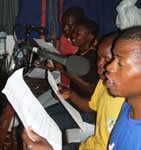Fictional heroes tackle climate change

The drama, titled Bravos do Zambeze (‘Zambezi Braves'), was created in an effort to communicate through stories and characters, key information about naturally caused emergencies, such as floods and cyclones.
Year 2000 flood
Mozambique has been subjected to seasonal floods for years, with the year 2000 flood dubbed as the worst in half a century. Excessive rainfall hit the Southern African country after a cyclone struck, leaving 800 people dead. About 1,400 km² and 20,000 head of cattle were lost, but the event that will remain at the back of people's minds is the story of baby Rosita - the infant born in a tree her mother had climbed to escape the rising water. The increased frequency and severity of natural disasters in Mozambique has been partially attributed to climate change.
The drama, available in Portuguese and local language Sena, is designed to convey information around natural disasters and strategies to reduce the devastating consequences they can have on local communities.
Rising global temperatures

The causes and effects of climate change are, by now, undeniable. According to the Intergovernmental Panel on Climate Change (IPCC), global temperatures have risen an average of 0.74 degrees Celsius since the year 1905. This rise in temperature has been attributed to increased greenhouse gases like carbon dioxide (CO2) becoming trapped in the atmosphere. According to the website of the upcoming United Nations Climate Change Conference, current CO2 levels are significantly higher than they have been at any time in the last 650,000 years - around 385ppm (parts per million).
With the rise in global temperatures, the planet has also seen a rise in natural disasters, in particular climatic disasters such as floods and cyclones. Although the bulk of the blame for climate change sits with the industrialised nations, the brunt of the impact is borne by non-industrialised countries in South America, Asia and Africa. In many cases, natural disasters are hampering countries' abilities to deal with other concerns, such as improving infrastructure, developing their economies and combating poverty and health issues.
The impact on communities is clear. “Wide scale displacement of people resulting from floods goes far beyond the immediate and devastating impact,” says the IOM. Although the Bravos story is entertaining, it is designed to convey information around disaster preparedness and climate change, as well as strategies for longer-term disaster management.
Conveying info through drama
Radio drama provides a unique medium for conveying information. It is widely accessible, does not rely on literacy, and can reach remote places. In a drama, information is communicated and desired behaviours modeled by characters, and it engages listeners at both emotional and intellectual levels. According to Claudio Jamal of World Vision in Mozambique, radio drama can have a big impact on local communities because they “are the biggest consumers and quickly spread information [broadcast] via local radios.”

Season one deals with the immediate aftermath of flooding, what can happen if people are not prepared, physical and mental health issues such as cholera and psychological trauma, and the importance of sticking together as a community. Season two introduces the community's decision to rebuild their village, looks at climate change adaptation and disaster preparation, and the need to educate communities around why age-old techniques may need to change.
It also introduces new characters, in particular a young female NGO worker who helps with reconstruction. This character, who interacts mainly with a male elder, allows the story to examine several different dynamics relevant to the effectiveness of disaster risk reduction projects: the tensions that can come from a younger person trying to tell an older person what to do; the resistance that people can have to change and new ideas; and the gender dynamics that come into play when a woman steps into a non-traditional role.
The drama series is accompanied by original theme music that uses a combination of carefully written lyrics and catchy beats to take the messages further.
Making people aware
The devastating consequence of natural disasters and the resulting relocation of populations present a formidable challenge for organisations, humanitarian agencies, and governments. At the same time, the complex web of related issues - changing climates, cultural perceptions, lack of education, gender inequalities - make it even harder to communicate much needed preventative and emergency information.
IOM believes that the media and projects like Bravos do Zambeze “can help make people more aware of how to prepare for emergencies before they happen, thereby mitigating much of the negative effects.” And while we will likely never see a return to pre-industrial CO2 levels - 280ppm - any significant reduction would spell good news for Southern nations that already have their hands full.























